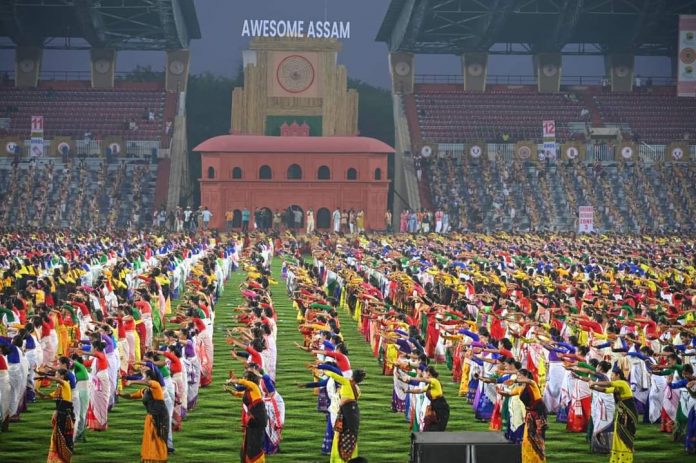Over 11,000 folk dancers and drummers will perform the Bihu dance in Assam today with an aim to put their performance on Rongali Bihu, the state’s spring festival which marks the beginning of the Assamese new year, in the coveted Guinness Book of World Records.
Rehearsals are taking place in full swing at Sarusajai Stadium in Guwahati ahead of the historical moment. The certificate will be handed over by Prime Minister Narendra Modi, who will be in the state to celebrate the state’s spring festival.
According to Chief Minister Himanta Biswa Sarma, the aim is to “organise the largest Bihu dance performance at a single venue and make it to the Guinness Book of World Records in the folk-dance category”.
Addressing the media here in Guwahati, CM Sarma said, “The Guinness World Record attempt on the Bihu dance will be held on April 13 from 5.30 pm to 6.30 pm and it will be certified on April 14 in the presence of Prime Minister Narendra Modi. Thus, I urge the citizens of the state and Guwahati city to come and witness the mega Bihu dance on Thursday.”
“The performance itself will just be around 15 minutes long. But the logistics involved are massive, beginning with the selection of the artistes,” CM Sarma said.
The chief minister also mentioned that the state government has set a target for two world record attempts, one for the largest Bihu dance in a single frame and another will be largest (Dhuliya) Drummer ensemble.
The entry inside the Sarusajai on April 13 will be free, however, entry inside the stadium on April 14 is open to only for the invitees and persons carrying the government issued passes for the grand event, informed CM Sarma.
The chief minister has further informed that state government has decided to provide Rs 25,000 each to all the Bihu dancers and Dhuliyas (Drummers) along with the master trainers who will perform for the mega bihu event for the Guinness World Record.
At least 70 percent of the performers would be women and 30 percent men, an official said. The performers would include singers and those playing traditional instruments such as dhol, taal, gogona, toka, pepa and xutuli, he said.
The performers were selected from across the state. With 1,400 in attendance, Dibrugarh will have the most representation and South Salmara will have the least representation with 20 performers.
The most crucial part of the process was choreographing a routine that 11,140 dancers from different parts of the state could perform in synchrony.





